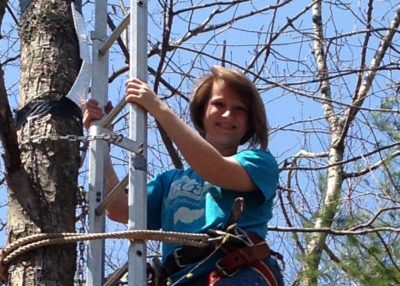Matheny Awarded NSF CAREER Grant to Research Water Storage in Trees
November 1, 2021

Ashley Matheny, an assistant professor in the Department of Geological Sciences, secured a prestigious grant from the National Science Foundation’s Faculty Early Career Development Program. This award, known as a CAREER grant, provides five years of funding to help early-career faculty members establish a strong research and educational program that leads to a lifetime of leadership in their field.
Matheny’s research will create novel sensors to directly measure water content at different depths when inserted in trees. She is collaborating with Pete Marchetto of Conservify, who is already constructing a prototype that measures the lateral transport of water in a tree. This type of transport is poorly understood since water movement is typically observed
vertically from roots to stems.
“I am excited about this project and to help discover a more complete picture of how plants use water,” said Matheny. “Our hypothesis is that defunct vessels in trees retain water, even if they are not actively transporting it, and can act as a backup or storage unit for the tree when it is water limited.”
Matheny plans to measure water content in two contrasting North American forest types: a temperate, deciduous forest of red oak, white pine and red maple common in Michigan’s deep sandy soils, and a semi-arid evergreen forest of Ashe juniper and live oak rooted in the rocky limestone landscape of central Texas. The research location for the semi-arid evergreen forest is the White Family Outdoor Learning Center, a 266-acre, outdoor classroom in the Texas Hill Country that was recently donated to the Jackson School by Leslie P. and Dianne White. This field station is fast becoming a local go-to area for research in hydrology.
The CAREER grant also has a strong educational component and provides resources to work with collaborators at Arizona State University to create immersive videos that provide remote “field experiences” for college and AP high school students throughout Texas. These videos, which will have Spanish and English versions, will take students to the White Center, the field site in Michigan, and an additional research site: a mangrove forest at The University of Texas at Austin’s Marine Science Institute in Port Aransas, Texas.
“These virtual field trips should increase inclusivity through student access to the geosciences,” said Matheny. “This grant will give us a great start after COVID-19 and the new world we are adapting to with online education. I want the kids to see the exciting world they can discover studying the earth sciences!”
Back to the Newsletter